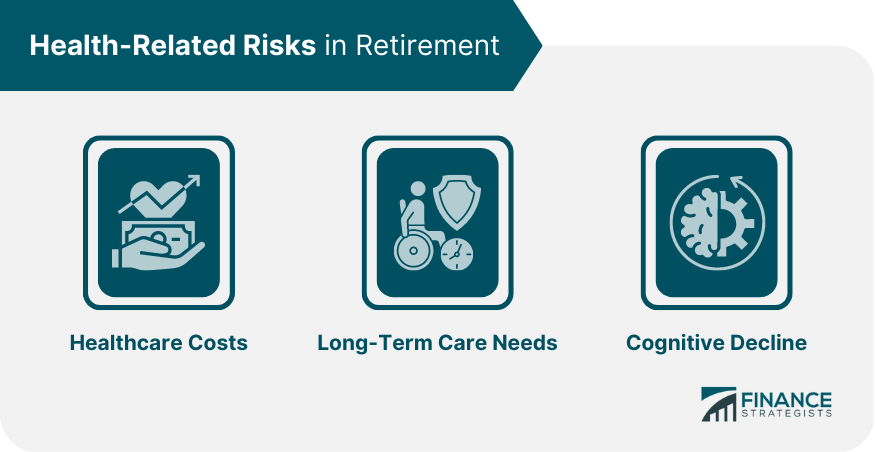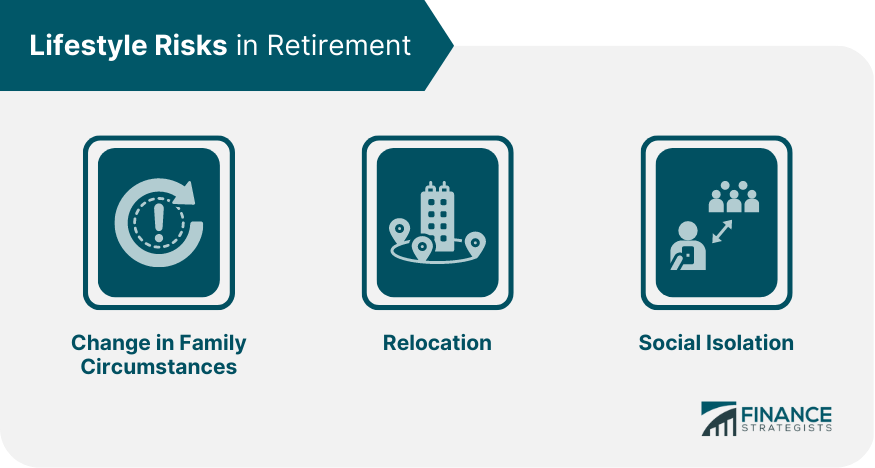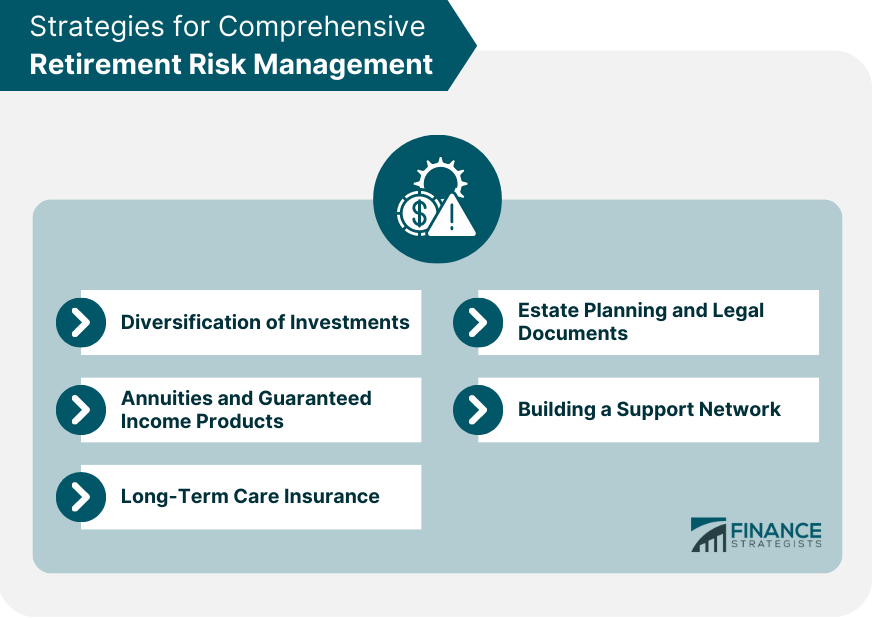What Is Retirement Risk Management?
Retirement risk management involves identifying, assessing, and mitigating various risks that could potentially threaten the financial security and overall well-being of individuals during their retirement years.
Effective retirement risk management is crucial for ensuring a secure and fulfilling retirement. By proactively addressing potential risks, individuals can better protect their financial resources and maintain their desired lifestyle throughout retirement.
Financial Risks in Retirement
Market Risk
Volatility in Investment Returns
Market risk refers to the possibility of fluctuations in investment returns due to economic conditions, political events, or other factors. Such volatility can negatively impact retirement savings and overall financial stability.
Strategies for Managing Market Risk
To manage market risk, retirees can diversify their investment portfolios across different asset classes, such as stocks, bonds, and cash.
They can also consider investing in low-cost, passive investment vehicles, like index funds or exchange-traded funds, to minimize the impact of market fluctuations.
Inflation Risk
Impact on Purchasing Power
Inflation risk is the potential decrease in purchasing power of retirement savings due to rising prices over time. Inflation can erode the value of fixed-income investments and reduce the real income generated from retirement assets.
Strategies for Managing Inflation Risk
To manage inflation risk, retirees can include inflation-protected investments, such as Treasury Inflation-Protected Securities (TIPS) or inflation-adjusted annuities, in their portfolios.
Additionally, they can maintain a portion of their investments in growth-oriented assets, such as stocks, to help offset the effects of inflation.
Interest Rate Risk
Impact on Fixed-Income Investments
Interest rate risk arises from changes in interest rates, which can negatively affect the value of fixed-income investments, like bonds. When interest rates rise, bond prices tend to fall, potentially leading to capital losses for investors.
Strategies for Managing Interest Rate Risk
To manage interest rate risk, retirees can consider laddering their bond investments, which involves purchasing bonds with different maturity dates to spread interest rate exposure.
They can also diversify their fixed-income investments across various bond sectors and maturities to reduce the impact of interest rate fluctuations.
Longevity Risk
Outliving Retirement Savings
Longevity risk refers to the possibility of outliving one's retirement savings, which can result in financial hardship during later years. As life expectancies continue to rise, longevity risk has become a growing concern for retirees.
Strategies for Managing Longevity Risk
To manage longevity risk, retirees can consider delaying Social Security benefits to increase their monthly payments, purchasing annuities to provide guaranteed lifetime income, or maintaining a portion of their investments in growth-oriented assets to help support a longer retirement.
Health-Related Risks in Retirement
Healthcare Costs
Rising Medical Expenses
Healthcare costs represent a significant risk for retirees, as medical expenses tend to increase with age. Unexpected health issues or the need for long-term care can also lead to substantial out-of-pocket costs.
Strategies for Managing Healthcare Costs
Retirees can explore various Medicare options, purchase supplemental insurance policies, and utilize Health Savings Accounts (HSAs) or other tax-advantaged savings vehicles to help cover medical expenses.
Long-Term Care Needs
Cost of Long-Term Care Services
Long-term care needs pose a significant financial risk for retirees, as the costs of nursing home care, assisted living facilities, or in-home care can be substantial and are often not fully covered by traditional health insurance or Medicare.
Strategies for Managing Long-Term Care Needs
Retirees can consider purchasing long-term care insurance, exploring alternative care options such as adult day care or respite care, and planning for potential Medicaid eligibility to help cover expenses.
Cognitive Decline
Impact on Decision-Making Abilities
Cognitive decline, including conditions such as Alzheimer's disease or other forms of dementia, can negatively affect a retiree's ability to make sound financial and personal decisions, potentially putting their retirement security at risk.
Strategies for Managing Cognitive Decline
To manage the risk of cognitive decline, retirees can establish a durable power of attorney and a healthcare proxy to designate trusted individuals to make financial and medical decisions on their behalf.
They should also consider creating a comprehensive estate plan to ensure their wishes are fulfilled in the event of incapacity.

Lifestyle Risks in Retirement
Change in Family Circumstances
Divorce or Loss of a Spouse
Changes in family circumstances, such as divorce or the loss of a spouse, can have significant financial and emotional consequences for retirees, potentially disrupting their retirement plans.
Strategies for Managing Changes in Family Circumstances
To manage the risks associated with changes in family circumstances, retirees can maintain an emergency fund, review and update beneficiary designations, and work with a financial advisor or attorney to create a plan for addressing potential financial challenges.
Relocation
Costs and Benefits of Relocation
Relocation during retirement can present both financial and lifestyle risks, as moving to a new area can involve unexpected costs and challenges in adapting to a new community.
Strategies for Managing Relocation Risks
To manage relocation risks, retirees should thoroughly research potential destinations, consider the costs of living and housing, and visit potential locations to gain firsthand experience before making a decision.
Social Isolation
Impact on Mental and Physical Health
Social isolation can negatively impact retirees' mental and physical health, leading to a decline in overall well-being. Maintaining an active social life and a sense of community is crucial for a fulfilling retirement.
Strategies for Managing Social Isolation
To manage the risk of social isolation, individuals can engage in social activities, join clubs or organizations, volunteer, or participate in lifelong learning programs to stay connected with others and maintain a sense of purpose during retirement.

Strategies for Comprehensive Retirement Risk Management
Diversification of Investments
Diversifying investments across different asset classes and sectors can help protect retirement savings from various financial risks.
Annuities and Guaranteed Income Products
Purchasing annuities or other guaranteed income products can provide a steady stream of income during retirement, helping to manage longevity risk and other financial uncertainties.
Long-Term Care Insurance
It can help cover the costs of long-term care services, reducing the financial burden on retirees and their families.
Estate Planning and Legal Documents
Establishing a comprehensive estate plan and ensuring that legal documents, such as wills, trusts, and powers of attorney, are in place can help protect retirees' assets and ensure their wishes are carried out in the event of incapacity or death.
Building a Support Network
Creating and maintaining a strong support network of family, friends, and professional advisors can help retirees navigate potential risks and challenges during retirement.

Conclusion
A comprehensive approach to retirement risk management is vital for achieving a secure and fulfilling retirement.
By proactively addressing various financial, health-related, and lifestyle risks, individuals can better protect their financial resources and maintain their desired quality of life throughout their retirement years.
It is crucial for retirees to be aware of the potential risks they may face and develop appropriate strategies to mitigate them. By identifying, assessing, and implementing effective risk management strategies, individuals can ensure a more secure and satisfying retirement experience.
Building a diverse investment portfolio, purchasing annuities or guaranteed income products, establishing an estate plan, and maintaining a strong support network can all contribute to a successful retirement.
Ultimately, proactive and comprehensive risk management allows retirees to face their golden years with confidence and peace of mind.
Retirement Risk Management FAQs
Retirement risk management is the process of identifying and mitigating risks that could negatively impact an individual's financial security in retirement. This can include risks such as market volatility, inflation, longevity, healthcare costs, and unexpected expenses.
Retirement risk management is important because it can help individuals protect their financial security and quality of life in retirement. By identifying and mitigating risks, individuals can minimize the impact of unexpected events and better manage their retirement income and expenses.
Strategies for retirement risk management can include diversifying retirement income sources, such as through a combination of Social Security, pensions, retirement savings, and annuities. Individuals can also consider purchasing long-term care insurance, building an emergency fund, and developing a comprehensive retirement plan that considers potential risks and contingencies.
A financial advisor or retirement planner can help individuals identify and mitigate retirement risks by evaluating their financial situation, developing a personalized retirement plan, and providing ongoing advice and guidance. They can also provide education and resources on retirement risk management strategies.
Common retirement risks that individuals should be aware of include market volatility, inflation, longevity, healthcare costs, and unexpected expenses such as home repairs or family emergencies. It's important to consider these risks when developing a retirement plan and to have strategies in place to mitigate their potential impact.
True Tamplin is a published author, public speaker, CEO of UpDigital, and founder of Finance Strategists.
True is a Certified Educator in Personal Finance (CEPF®), author of The Handy Financial Ratios Guide, a member of the Society for Advancing Business Editing and Writing, contributes to his financial education site, Finance Strategists, and has spoken to various financial communities such as the CFA Institute, as well as university students like his Alma mater, Biola University, where he received a bachelor of science in business and data analytics.
To learn more about True, visit his personal website or view his author profiles on Amazon, Nasdaq and Forbes.











